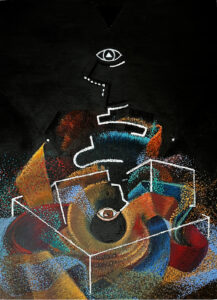The Phenomenal Atlases
 Physicists study the physical world on spatial, temporal and complexity scales inaccessible through ordinary human perception. How is it then possible for a person to form an understanding of physics at these scales? The Phenomenal Atlases is a framework that approaches this question by integrating artistic and intellectual methodology, informed by the history of science, theories of embodied cognition, and Maurice Merleau-Ponty’s philosophy of phenomenology. My goal is to understand the subjective, internal representations of physics concepts used by practicing physicists and to explore their impact on their collective research efforts.
Physicists study the physical world on spatial, temporal and complexity scales inaccessible through ordinary human perception. How is it then possible for a person to form an understanding of physics at these scales? The Phenomenal Atlases is a framework that approaches this question by integrating artistic and intellectual methodology, informed by the history of science, theories of embodied cognition, and Maurice Merleau-Ponty’s philosophy of phenomenology. My goal is to understand the subjective, internal representations of physics concepts used by practicing physicists and to explore their impact on their collective research efforts.
More precisely, the driving question of my inquiry is, How does a physicist, a living, breathing organism whose primary knowledge is rooted in the interaction of its body with the physical world, ground their understanding of physics of the imperceptible? In relation to the field as a whole, we can also ask, To what extent, and how, does a physicist’s research methodology (theoretical, experimental, or computational) shape the features of the mental models they use to perform their work? Conversely, To what extent and how do a physicist’s mental models affect the way they approach a research problem? And finally, How do physicists’ mental models and the corresponding collectively-accepted representations inform one another and impact physics research?
“Scientific thinking, a thinking which looks on from above, and thinks of the object-in-general, must return to the ‘there is’ which underlies it; to the site, the soil of the sensible and opened world such as it is in our life and for our body — not that possible body which we may legitimately think of as an information machine but that actual body I call mine, this sentinel standing quietly at the command of my words and my acts. Further, associated bodies must be brought forward along with my body — the “others,” not merely as my congeners, as the zoologists says, but the others who haunt me and when I haunt; the ”others” along with whom I haunt a single, present, and actual Being as no animal every haunted those beings of his own species, locale, or habitat.” [1]
Maurice Merleau-Ponty
[1]. Maurice Merleau-Ponty, “Eye and Mind.” Translated by Carleton Dalery. The primacy of perception: and other essays on phenomenological psychology, the philosophy of art, history, and politics. Ed. James M. Edie. 1964. Northwestern University Press.
Writing
- Kaća Bradonjić,. “Beyond the Dichotomy of Literal and Metaphorical Language in the Context of Contemporary Physics” Open Philosophy 7, no. 1 (2024): 20240050. https://doi.org/10.1515/opphil-2024-0050
- Kaća Bradonjić, The Phenomenal Atlases of Contemporary Physics: Knowing the Imperceptible. Leonardo 2023; 56 (6): 586–591. doi: https://doi.org/10.1162/leon_a_02424
- Atlases of Contemporary Physics: Initial Prospectus, July 2, 2022.
Artist Residencies and Short Visits
- February 22-28, 2023, Santa Fe Institute, Santa Fe, NM.
- October 1, 2022-January 31, 2023, Institute for Artificial Intelligence and Fundamental Interactions (IAIFI) at Massachusetts Institute of Technology, Cambridge, MA. (https://iaifi.org/partnerships.html#artist-in-residence)
Talks
- “Beyond Reach: On Understanding in Physics” in conversation with David Kaiser and Tracy Slatyer. Catalyst Conversations. MIT List Visual Arts Center. November 1, 2023.
- “Beyond the Literal/Metaphorical Dichotomy in Physical Sciences.” Science: Between Literal and Metaphorical Meanings?, joint workshop organized by Champalimaud Foundation and University of Lisbon. Lisbon, Portugal. 20-21 April 2023.
- “The Phenomenal Atlases of Physics.” Physics Department Seminar, Bard College, Annandale-on-Hudson, NY. November 11, 2022.
- “Return to the phenomenal: An exploration of the subjective, internal representations of the knowledge of fundamental physics and their relations to the collective pursuits of knowledge.” Internal Discussion Seminar, NSF AI Institute for Artificial Intelligence and Fundamental Interactions (IAIFI) at Massachusetts Institute of Technology, Cambridge, MA. October 21, 2022.